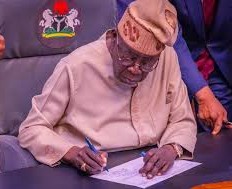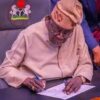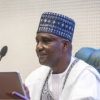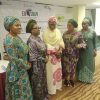Yiaga Africa, a non-governmental civil society organisation in Nigeria, has outlined the procedures and framework for Nigerian citizens to participate in the appointment of the Independent National Electoral Commission (INEC) chairman and commissioners. This statement comes as the tenure of the current chairman of the Independent National Electoral Commission, Professor Mahmood Yakubu, is nearing its
Yiaga Africa, a non-governmental civil society organisation in Nigeria, has outlined the procedures and framework for Nigerian citizens to participate in the appointment of the Independent National Electoral Commission (INEC) chairman and commissioners.
This statement comes as the tenure of the current chairman of the Independent National Electoral Commission, Professor Mahmood Yakubu, is nearing its conclusion. After serving two terms totalling ten years, his time as chairman is scheduled to end next month.
There has been considerable public discussion regarding the tenure of the INEC chairman, potential candidates for his succession, and the procedures to be followed in appointing his replacement as the 2027 general elections approach.
Yiaga, in its publication titled “Framework for Citizen Engagement in the Appointment and Reappointment of INEC Chairman and Commissioners,” stated that the process of selecting individuals for roles such as the chairman of the electoral commission should involve thorough review and assessment, as the credibility of electoral activities is linked to public perception of the independence and impartiality of those appointed.
Yiaga cites the Nigerian Constitution (S.154, Paragraph 14, Part F, Third Schedule), which gives the President authority to appoint the INEC Chairman and commissioners, pending Senate confirmation and consultation with the Council of State. Appointees must be non-partisan and have unquestionable integrity.
Yiaga pointed out that citizens have roles to ensure that only qualified and impartial individuals who meet constitutional requirements are appointed to the commission. The organisation also stated that the appointment process should be transparent and involve citizen participation.
The publication by YIAGA aims to promote citizen engagement in the appointment process of individuals nominated as INEC chairman and commissioners, with its rationale based on encouraging citizens’ active participation.
The document also projected the stages to follow through, and level of transparency and the openness the relevant individuals must maintain before a suitable chairman would be appointed.
“Citizen participation in public appointments strengthens legitimacy, enhances transparency, and safeguards the appointment process from politicisation and manipulation. The framework reinforces the right of citizens to participate in their government as enshrined in the Constitution (S.14), and it aligns with the procedure for appointment and the Standing Orders governing the screening and confirmation of executive nominees in the Senate.
Objectives of the Framework
“Integrate citizens’ engagement in the appointment process to ensure transparency in the appointment and screening of nominations to INEC. Ensure the appointment of competent and non-partisan individuals. Prevent political capture of INEC through appointments
Inspire public trust and confidence in the electoral commission.
Stages in the Appointment and Reappointment Process
Stage 1: Presidential Nomination of INEC Nominees
Before nominations are forwarded to the Senate for Confirmation, the President should;
Publish the names of prospective nominees and invite the public to submit inputs or objections.
Invite credible civil society organisations, professional bodies, and electoral stakeholders to make submissions;
Evaluate the submissions on their merit and communicate their outcomes to the public.
Stage 2: Screening of Nominations by the Nigerian Senate
Public Notice: Upon receipt of the nominations from the President, in addition to reading the presidential communication at plenary, publish.
The full names, qualifications, and private/public service records on the National Assembly website, print and electronic media and social media platforms
Submission of Memorandum and Petitions on INEC Nominees
Publish a call for memoranda and petitions on nominees within 48 hours of receiving the nomination letter from the President.
The call for memos and petitions should be published on the National Assembly website, print and electronic media, and social media platforms.
Submissions shall be made via a designated email or physical drop-off at the Senate Committee Secretariat.
Open Screening Sessions
Ensure live broadcast of the screening session on electronic and digital media platforms.
Allow accredited observers to attend screening sessions.
Invite oral presentations from political parties, institutions and individuals that submit memoranda and petitions during the screening process
Reporting on Citizens’ Submissions
Acknowledge the receipt of the memorandum and petitions
Publish a public report with details on the number of petitions, contents and objections, including how the committee addressed issues raised in the memos and petitions and reasons behind the committee’s resolutions.
This framework deepens the integrity, transparency and credibility of the appointment process. It presents a pathway for rebuilding public confidence in the INEC ahead of the 2027 elections.
Citizens’ Criteria for INEC Chairman and Commissioners
Nonpartisan: No affiliation with any political party, past or present
Unquestionable integrity and character
Expertise in elections or a related field.
Courageous and independent:
Ability to withstand political interference.
Mental alertness to withstand the rigours of election administration”



















